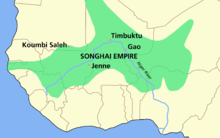Early History ca. 700-1591
Mali's early history was dominated by three famed West African empires-- Ghana, Mali, and Songhai. These empires controlled trans-Saharan trade in gold, salt, and other precious commodities and were in touch with Mediterranean and Middle Eastern centers of civilization (Timbuktu was the major trade city). All of the empires arose in the area then known as the western Sudan, a vast region of savanna between the Sahara Desert to the north and the tropical rain forests along the Guinean coast to the south. All were characterized by strong leadership (matrilineal) and kin-based societies. None had rigid geopolitical boundaries.
 |
| The extent of the Songhai Empire imposed over current (2010) state borders |
The Kingdoms ca. 1592-1892
After the Empires faded from power, kingdoms rose to power and expanded to include areas that are now Mali, Guinea, Cote D'Ivoire and parts of Burkina Faso. They were all challenged to some extent by each other, but all fell to French rule around the 1890s.
French Colonization, 1892-1960
Mali fell under French colonial rule in 1892. French Sudan was administered as part of the Federation of French West Africa and supplied labor to France’s colonies on the coast of West Africa. In 1958 the renamed Sudanese Republic obtained complete internal autonomy and joined the French Community. In early 1959, the Sudanese Republic and Senegal formed the Federation of Mali, which gained full independence from France as part of the French Community on June 20, 1960.
Senegal quickly seceded a few months later and the Sudanese Republic renamed itself the independent nation of Mali on September 22, 1960 (Mali's official independence day). A one-party state was established, Mali withdrew from the French Community in 1962, adopted an independent African and socialist orientation with close ties to the Eastern bloc. Following a progressive economic decline, however, Mali was forced to rejoin the Franc Zone in 1967.
Independence
In 1968 fourteen military members staged a bloodless coup d'etat and created a one party system with Lt. Moussa Traoré as president. Mali stayed relatively calm for the next decade (save for a border dispute over minerals with Burkina Faso in 1985). Slowly, Malian opinion shifted towards a multi-party democracy.
Rule by dictatorship was brought to a close in 1991 by a military coup - led by the current president Amadou Toure - enabling Mali's emergence as one of the strongest democracies on the continent. President Alpha Konare won Mali's first democratic presidential election in 1992 and was reelected in 1997. In keeping with Mali's two-term constitutional limit, Konare stepped down in 2002 and was succeeded by Amadou Toure, who was subsequently elected to a second term in 2007. The elections were widely judged to be free and fair.
 |
| The Flag of Mali in traditional Pan-African colors |
General Information
Mali is roughly the size of two Texases (but just a bit smaller). It shares borders with Algeria, Burkina Faso, Guinea, Cote D'Ivoire, Mauritania, Niger, and Senegal. Its terrain is described as "mostly flat to rolling northern plains covered by sand; savanna in south, rugged hills in northeast." I'm going to miss the idea of being near a rainforest... but I like sand. You can make castles out of it. Also, sand means camels. And I freaking love camels.
Abject poverty comes with an entire set of issues all of its own, and Mali is no exception. Mali has the third highest birth rate in the world (46 births per 1,000 people-- compared with 13.83/1,000 in the US) and also one of the highest infant mortality rates (113 deaths per 1,000 live births-- compared with just 8.38/1,000 in the US). The average woman has an incredible 6.8 children in her lifetime. Only 3% of Mali's population makes it past his or her 65th birthday, and total life expectancy is around 52 years old. These are all statistics that will become real to me. They will have faces, have names, and be a part of my daily life. These are statistics that the Peace Corps aims to ameliorate.
Literacy hovers around 46% with males being vastly more educated and literate than females. Mali is 90% Muslim, 9% indigenous beliefs, and 1% Christian. Its population is estimated to be around 13.8 million people, with the ethnic breakdown as follows (Mande 50% (Bambara, Malinke, Soninke), Peul 17%, Voltaic 12%, Songhai 6%, Tuareg and Moor 10% [Saharan nomads!], other 5%). About 80% of Mali speaks Bambara, which is what I'll likely be learning. The official language is French, but only the well-educated speak it. The time difference is five hours ahead of eastern time.
There is so much to learn! The more I read about it, the more excited I become. In the next few posts I'll talk more about the Peace Corps' history there and more about my job description and expectations.
